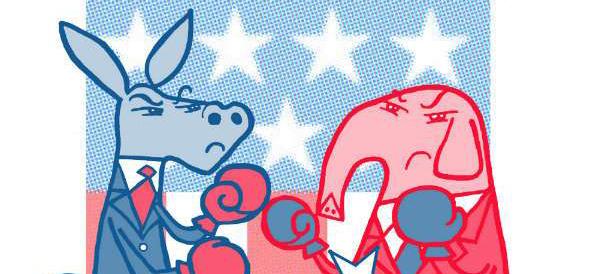The DePaul College Democrats and the DePaul College Republicans went head-to-head Tuesday night discussing the hot topics of this election cycle before Americans head to the polls Tuesday, Nov. 4.
The debate, named the “Sheffield Scuffle,” commenced at 7 p.m. in the Student Center and was moderated by Professor Joseph Mello. The two organizations debated on topics that were agreed to prior, with the formal topics being the economy, the environment, crime, and education.
When discussing the economy, Nicole Been, president of the College Republicans, advocated for keeping the minimum wage at its current levels and for “cutting the red tape, otherwise known as excessive and unnecessary taxes and regulations on businesses, particularly on small business.”
On the flip side, Kevin Brooks of the College Democrats Executive Board, and Marcus Cirone, political director of the College Democrats, each put forth the traditional Democratic views on increasing the minimum wage.
Both sides tended to stay true to the party line with the exception of the discussion on education. While DePaul junior Trey Cobb debated on the side of the College Republicans, he later admitted to not being a Republican.
Nassir Faulkner, vice president of the College Democrats, drew attention to this fact.
“Cobb said a lot of good things which is kind of ironic here because when we talk about education, it’s the Republicans who are always quick to cut it,” Faulkner said.
“Faulkner called me out for not actually being a Republican,” Cobb later joked with the audience.
Cobb said he had his viewpoints approved by the DePaul Republicans beforehand and that if he were eligible, he would vote for Bruce Rauner (R-Winnetka) in the hotly-contested governor’s race. Despite this, Cobb’s proposals on how to improve education in Illinois and around the country still took on elements of the Democratic Party.
In addition to addressing this contradiction, Faulkner steered the debate in a different direction during the discussion on crime.
“This is my big and bold idea …we should decriminalize and legalize the sale and procession of marijuana,” Faulkner said.
Citing Colorado as a successful example, Faulkner argued that Colorado is the solution to high crime rates.
“Let’s not put people in jail for possession of marijuana,” he said. “That’s a better response to the question of how do we decrease costs of prison.”
While there was no vote this year to determine an overall winner at the conclusion of the debate, both sides used part of their closing remarks to encourage the public to vote in the upcoming midterm elections Nov. 4.
The debate concluded with a question and answer portion that continued to spark debate between the DePaul Democrats and the DePaul Republicans, as well as members of the crowd.
Mello thought that the debate was an overall success.
“There was a good exchange of ideas and it was good to hear from the audience as well,” he said. “It’s great to have people passionate about politics out talking about politics.”
Both Rance and Been were impressed with how their respective clubs did and were glad to bring awareness about current political issues that are being debated at a national level to DePaul students.
“I’m really proud of everyone on our team. I really do think we ended up winning,” Rance said. “We’re pleased and happy at our performance. Of course, we’re going to make sure the next time we do this, we get an even better victory.”
On the other side, Been acknowledged the challenge of debating conservative stances in a very liberal environment.
“I think we did a great job given the audience. It’s hard to be a Republican at DePaul. We tried to make it as open and moderate as possible without compromising our beliefs,” Been said. “I think we presented our points well enough to present some different ideas and emotions to peoples’ minds.”
The debate provided a snapshot of the Republican’s general viewpoints and the Democrat’s general viewpoints at a national level. Another debate between the two sides is scheduled for some time during winter quarter.


